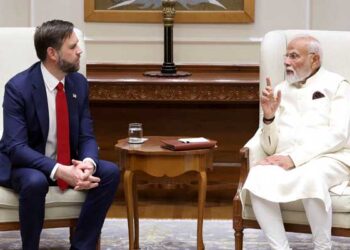The Worsening U.S. Reputation Amid Tariff Announcements
Introduction to U.S. Global Perception
In recent months, the United States has faced significant challenges in maintaining a favorable reputation on the global stage. A comprehensive analysis by Morning Consult indicates a dramatic decline in America’s image across numerous countries, particularly following President Donald Trump’s controversial tariff announcements. The latest data illustrates a trend of increasing anti-American sentiment, with implications that stretch from traditional allies to emerging markets.
Declining Favorability: Key Statistics
According to the data collected by Morning Consult, a staggering 38 out of 42 markets surveyed reported a decline in net favorability towards the U.S. The impact of the tariffs and their surrounding rhetoric cannot be understated, as they mark a significant shift in how many nations perceive American intentions and leadership.
Countries with Significant Favorability Drops
Some of the most notable declines in favorability were recorded among America’s long-standing allies:
- Canada: A sharp drop of 44 percentage points indicates that Canadian sentiment towards the U.S. has soured significantly.
- South Korea: With a decrease of 38 percentage points, South Korea, another key ally, is showing signs of unrest regarding U.S. policies.
- European Nations: Several European countries also reflected substantial downturns:
- Sweden: -47 percentage points
- France: -33 percentage points
- Norway: -36 percentage points
- United Kingdom: -31 percentage points
These figures illuminate the growing disenchantment felt by countries historically aligned with the United States.
Areas of Resilience: Markets Showing Stability or Increase in Favorability
While many nations are exhibiting a decline in favorability, not all countries have followed this pattern. Interestingly, responses from Malaysia indicated no change in net favorability between January and March of this year. In contrast, several countries have recorded an increase in positive perceptions of the U.S.:
- Israel: An increase of 4 percent
- China: Up by 6 percent
- Russia: A notable rise of 24 percent
Understanding Russia’s Shift
The increase in Russia’s favorability toward the U.S. is particularly intriguing. Analysts suggest that President Trump’s active engagement in discussions related to the war in Ukraine, as well as his diplomatic exchanges with Ukrainian President Volodymyr Zelensky, have contributed to this unexpected uptick. However, it’s crucial to contextualize this finding, as perceptions can be highly volatile and influenced by ongoing geopolitical events.
The Influence of Global Conflicts on U.S. Perception
In addition to the tariff announcements, two critical global conflicts have further complicated the U.S. image abroad—the war in Ukraine and the ongoing situation in Gaza.
Effects of the War in Ukraine
The U.S. response to the war in Ukraine has affected perceptions not just in Russia but across Europe and NATO allies. As America rallied against aggression, some nations have viewed U.S. involvement as a double-edged sword, leading to increased tension in relations.
The Gaza Conflict and Its Implications
The U.S. support of Israel during the conflict in Gaza has notably impacted its favorability in countries with large Muslim populations. Nations that historically align against perceived Western dominance have expressed frustration, leading to diminished approval ratings for the U.S.
Calculating Net Favorability: An Essential Metric
Net favorability is a critical measure in understanding public opinion about the United States. It is calculated by taking the percentage of approval for the U.S. and subtracting the percentage of disapproval. This metric allows for a clearer view of how U.S. policies and international events shape collective attitudes worldwide.
Conclusion
The complexities of global sentiment towards the United States highlight the interconnected nature of international relations and domestic policy decisions. As the landscape continues to evolve, the implications of these shifts will resonate deeply, influencing diplomatic ties, trade agreements, and global perception long into the future.






